Wege Speaker Series Wednesday, April 24, 2024
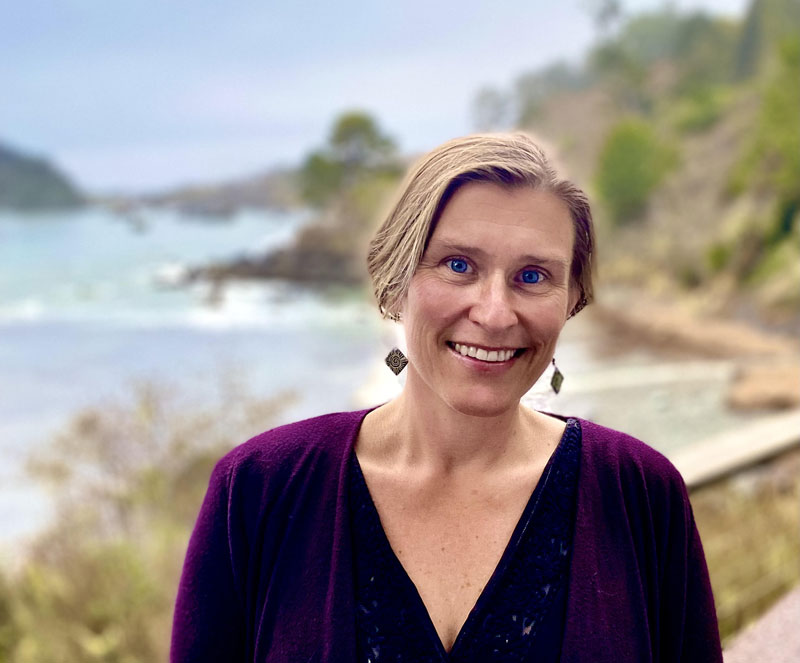

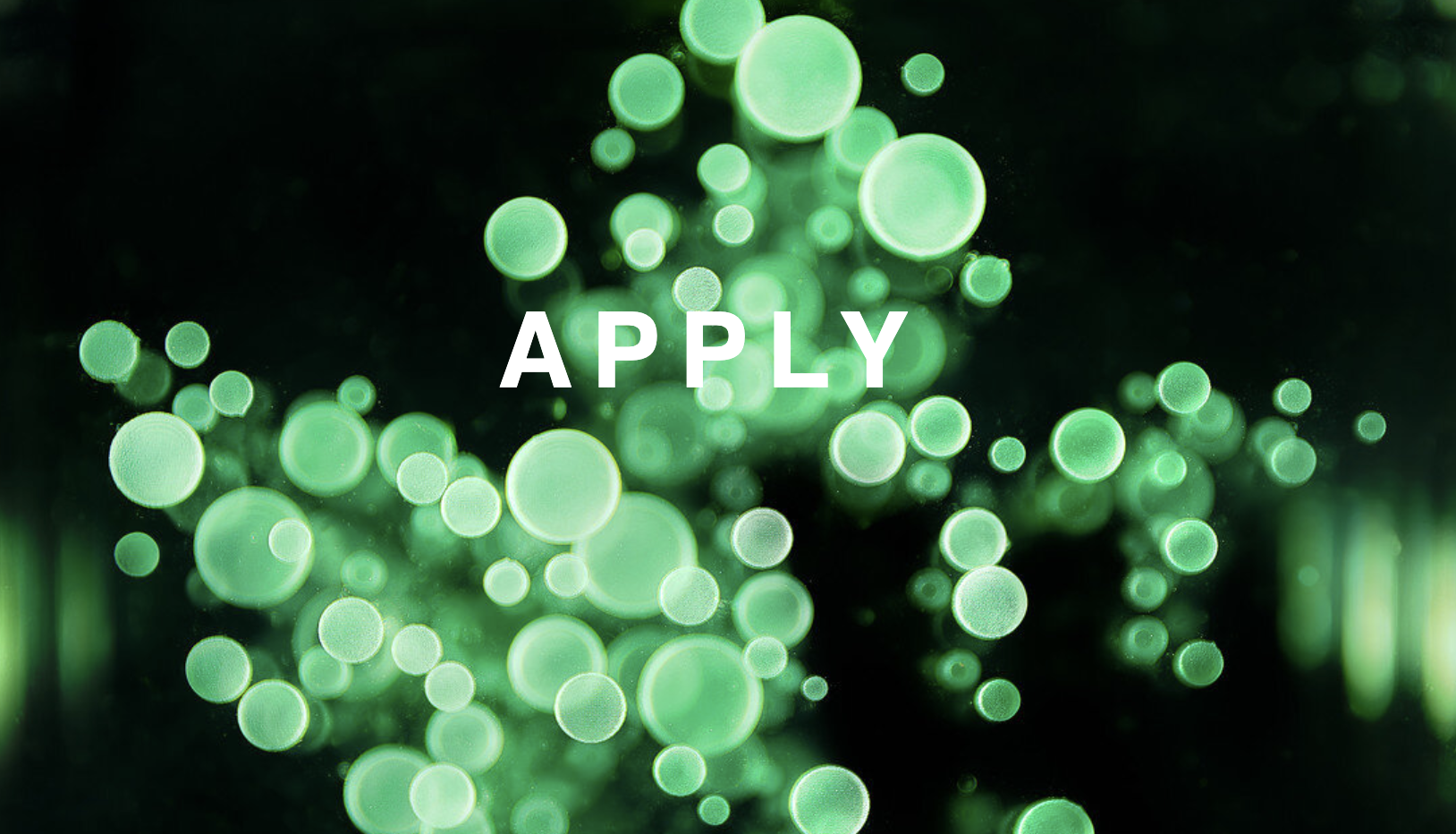
Team applications are due on October 8th, 2023 at 11:59pm ET.
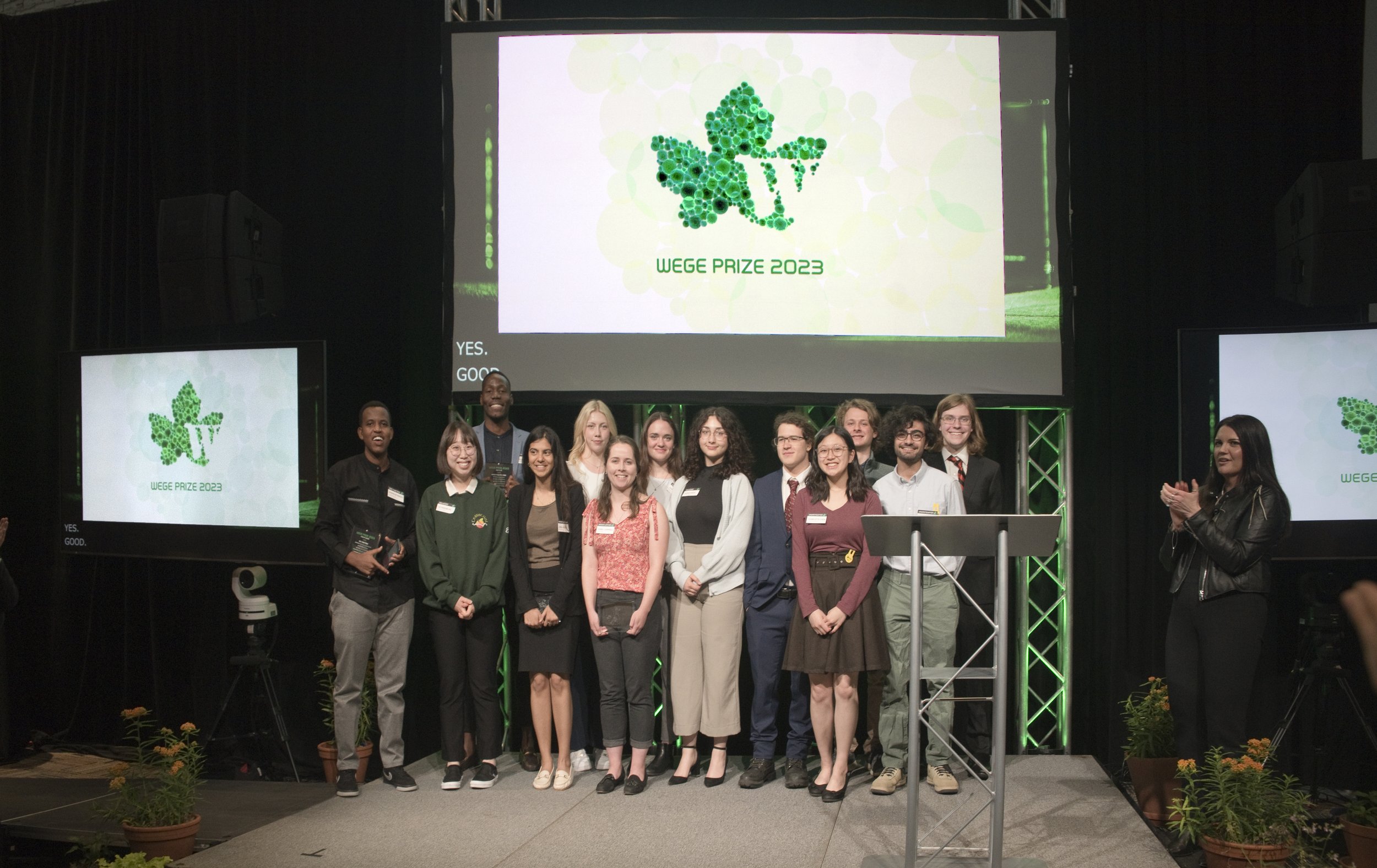
2023 Wege Prize winners announced: First-place U.S. team awarded $30,000 for alternative, sustainable leather material from banana plants.
Grand Rapids, Michigan, USA, June 5, 2023 —Three stand-out university student teams from around the world have taken winning spots in 2023 Wege Prize for their ground-breaking solutions to further a circular economy through sustainable approaches that mitigate waste and maximize productivity.
Organized by Kendall College of Art and Design of Ferris State University (KCAD), Wege Prize challenges fiveperson student teams worldwide to collaborate in the advancement of sustainable solutions to today’s “wicked problems” in ways that support a circular economy. Each of this year’s five finalist teams is sharing in the competition’s $65,000 USD in prize money for developing solutions that address agricultural waste, environmental pollution, and wastewater.
For the past decade, Wege Prize has identified winning teams in the interdisciplinary competition, with this year’s top three groups hailing from five countries and six academic institutions. The awarded teams faced an initial pool of 50 competing team representing 37 countries as they progressed through a narrowing selection of contenders during the nine-month, multiphase competition.
Wege Prize teams are inspired to reframe traditional production and consumption methods through a multidiscipline, immersive process encompassing diverse fields of study, cultures, and institutions. The teams’ intensive research, testing, networking, and prototyping is supported and refined through direct feedback from the competition’s panel of expert judges.
“The brilliant student teams that compete in Wege Prize give me hope that humanity will solve the serious ecological problems we face by designing equitable business models that regenerate nature and add economic value,” says sustainable business expert and core judge for Wege Prize, Bill Stough.
The winners of Wege Prize 2023 are:
3rd Place ($10,000): UnWastewater, a team using microbes to convert wastewater into raw materials for use in industrial and commercial products, closing the circle between the production and disposal of pharmaceutical chemicals.
2nd Place ($20,000): Green Poultry Farm addresses environmental impacts of poultry farming, with the Mozambique team’s students using anaerobic digestion to create usable waste streams.
1st Place ($30,000): Banana Leather whose team from Yale University’s business and environmental management programs is producing a sustainably made plant-based leather, mainly from banana crop waste.
Two other student teams, Cellucoat and Agri ThinkTank, each received $2,500 awards as finalists.
“Having a framework like the Wege Prize to kind of streamline our idea–the business model, the feasibility, the down-streaming impact, the social impact–has just been a way that we’ve had to develop this and forced us to think things that have been really helpful and instrumental in propelling this business forward,” says Jinali Mody, lead of the Banana Leather team, first-place winner of 2023 Wege Prize Award.
Wege Prize participants come from diverse academic programs at leading universities worldwide, including students from U.S. Ivy League schools to national science and technology universities in India, Africa, the United Kingdom, Canada, and other countries. The teams’ solutions are making a real-world impact. The 2019 finalist Rutopia’s eco-sensitive tourism concepts, covered by top editors at Forbes, gained funding and support. Others, like 2020 Wege Prize winner Hya Bioplastics and the 2021 team The Chilensis, have advanced to prestigious business incubators that lay the groundwork to implement their prize-winning ideas.
“Each participating Wege Prize team’s innovative ideas for new ways to develop products, services, and business models help drive a regenerative, circular economy,” says Gayle DeBruyn, KCAD professor and Wege Prize organizer. “We are proud of this year’s winners and grateful for all of our student teams and dedicated judges in their pursuit and support of real-world solutions to pressing global issues.”
Wege Prize is made possible through the continuing financial support of The Wege Foundation and KCAD, opening these unique opportunities for undergraduate, graduate, and post-graduate students around the world — and helping take strides toward a greater circular economy.

Jinali Mody presenting for team Banana Leather in Grand Rapids, MI at the 2023 Wege Prize Awards
Institution represented: Yale University
Disciplines represented: Business and the Environment, Industrial Ecology and Green Chemistry, Energy and Business, Energy Access, Business Administration
Producing plant leather from banana crop waste to create Ban-o-fi (for banana-fiber leather), this team’s material is comparable to animal hide in performance, but on a development pathway to being 100% biobased and biodegradable. Paired with a take-back program, their product expands the potential applications for the material and sets a new precedent for leather alternatives. While many current vegan leathers are plastics with potential environmental impacts, Banofi is vegan, cruelty-free, sustainable, and circular, “disrupting the highly polluting textile industry,” says the team. The material’s production upcycles crop waste, uses 90% less water and has 95% lower carbon emissions than animal leather.
“Our solution looks to create plant-based leather from crop waste — mainly the banana stem, which is left on fields to decay. The impact of this solution will be significant carbon emission savings, the number of livestock and exotic animals saved, the crop waste that is upcycled, waste-water pollution and heavy metal pollution avoided, resource reduction and additional income for farmers.”

Vasco Cossa presenting for team Green Poultry Farm in Grand Rapids, MI at the 2023 Wege Prize Awards
Institution Represented: Eduardo Mondlane University (Mozambique, Africa)
Disciplines Represented: Physics, Environmental Chemistry, Agronomic Engineering, Electronic Engineering
Taking on the wicked problem of environmental pollution associated with poultry farming in Mozambique, this team’s innovative system concept converts poultry waste into biogas and biofertilizers to meet energy needs within poultry production — and to grow feed to supplement farm animals’ diets.
The system’s biodigester system’s innovative use of anaerobic digestion converts poultry waste into biogas and biofertilizers. The biogas is converted into electricity and heat to meet energy needs within poultry production, and the biofertilizer is used to grow feed for the poultry. This promotes the maximum use of resources and contributes to the circular economy by keeping major pollutants in the loop.
“We identified anaerobic digestion as the approach that can address these wicked problems through waste recycling,” says the team. “It can aid in addressing both planetary boundaries and sustainable development goals.”
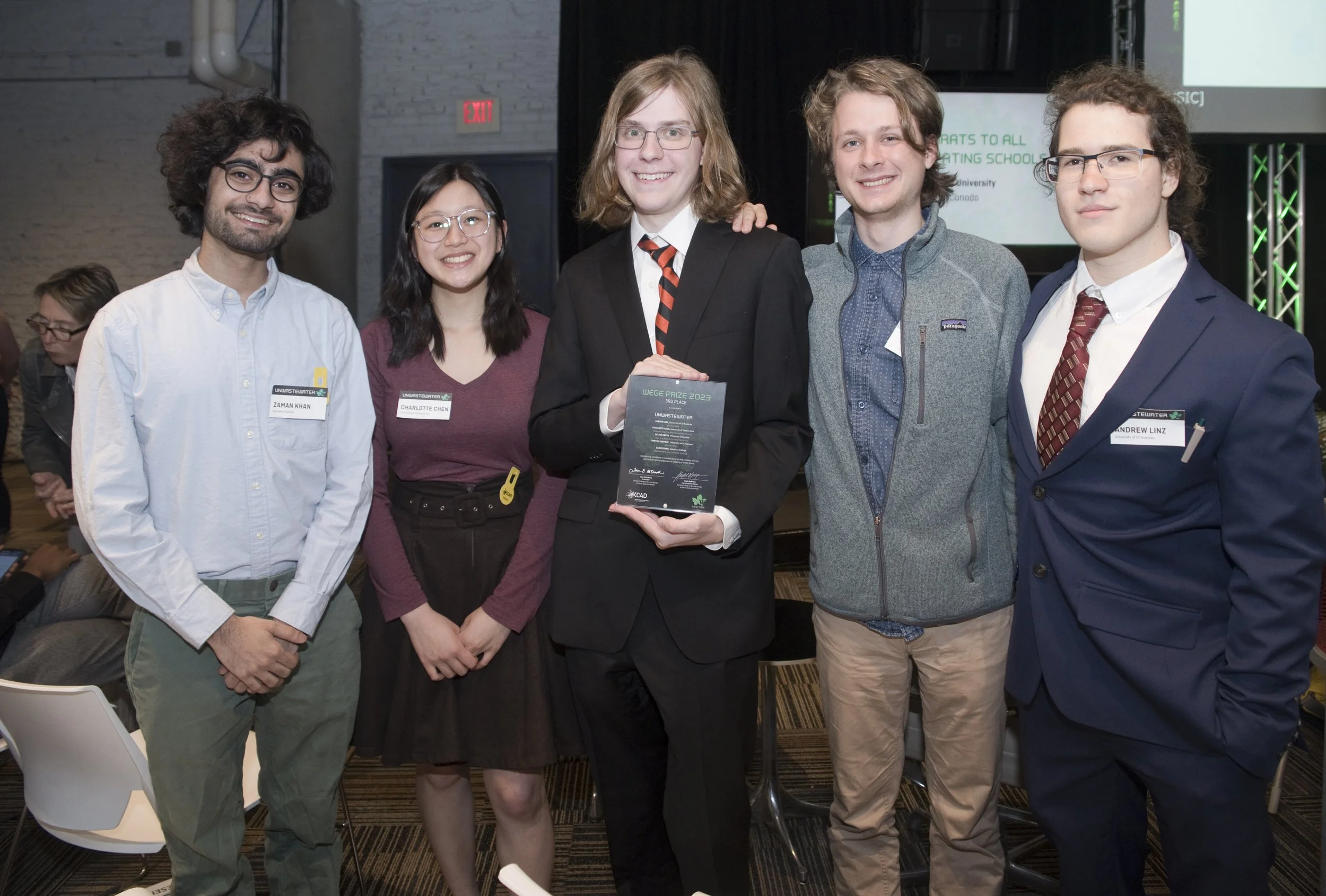
Team UnWastewater from left to right: Zaman Khan, Charlotte Chen, Kelvin Green, Timothy Redpath, Andrew Linz
Institutions Represented: Princeton University, Hamilton College University of St. Andrews (Scotland, United Kingdom), University of Connecticut
Disciplines Represented: Engineering, Computer Science, Biochemistry, Engineering, Biology
With the cycle of nature as its model, the team is looking to the premise of a circular economy to create a world without waste by designing closed loop systems to maximize efficiency, prevent pollution and achieve sustainability. To realize this ambitious vision, UnWastewater aspires to revolutionize the treatment of domestic wastewater by utilizing microbial electrosynthesis (MES).
This novel method of biochemical carbon capture and utilization is used to convert domestic wastewater into organic chemical feedstocks, and ultimately, protect the environment, human health and regenerate nature.
“The very term ‘wastewater’ belies the implicit assumption that this byproduct is valueless rather than a legitimate resource,” says the team. “We aim to demonstrate that this assumption is false; that even a substance as undesirable as wastewater has the potential to be an important industrial feedstock.”
About Wege Prize
Wege Prize, a West Michigan-born concept developed by Kendall College of Art and Design of Ferris State University’s (KCAD’s) Wege Center for Sustainable Design with the support of The Wege Foundation, is an annual competition that ignites game changing solutions for the future by inspiring college students around the world to collaborate across institutional, disciplinary, and cultural boundaries and redesign the way economies work.
About KCAD
Located in the heart of downtown Grand Rapids, Michigan, Kendall College of Art and Design of Ferris State University (KCAD) is committed to creating lasting impact in West Michigan and beyond through collaborative partnerships, cultural innovation, and an educational model that prepares students for leadership in design, the visual arts, and art history; provides innovative, collaborative education that fosters intellectual growth and individual creativity; and promotes the ethical and civic responsibilities of artists and designers, locally and globally. For more information, please visit kcad.edu.
About The Wege Foundation
Planting seeds that develop leaders in economicology, health, education, and arts, and enhance the lives of people in West Michigan and around the world. For more information, please visit wegefoundation.com.
Follow Wege Prize on KCAD’s Wege Center for Sustainable Design page on LinkedIn, Facebook (@wegeprize), Twitter (@wegeprize), Instagram (@wegeprize), for more content, updates on participants, and more.
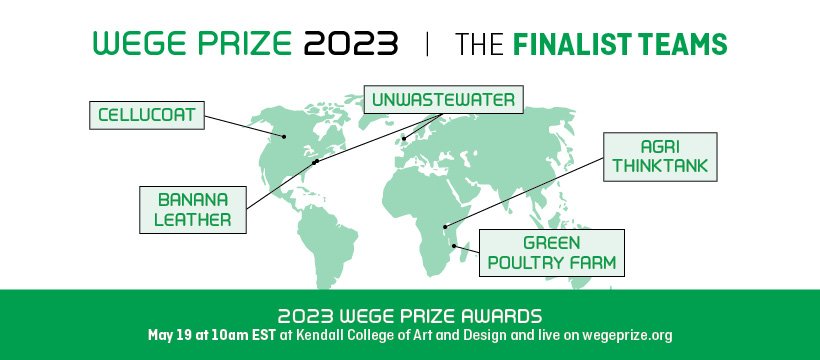
The five student teams, from nine countries and 10 academic institutions, debut innovations addressing waste, hunger, climate and injustice as they transform economy.
Grand Rapids, Michigan, USA April 17, 2023 —For a world reeling from hunger, climate impacts, food waste and inequity, five student teams have stepped forward with expert-reviewed and innovative solutions as part of Wege Prize 2023, with several projects focused on advances in agriculture that cut carbon emissions and sustain developing communities.
These groundbreaking ideas are nurtured by Wege Prize, organized by Kendall College of Art and Design’s Wege Center for Sustainable Design with support from the Wege Foundation. The annual competition ignites game-changing solutions for the future by inspiring college/university students around the world to collaborate across institutional, disciplinary, and cultural boundaries to redesign the way economies work. This year saw 60-plus entries from teams hailing from five continents. The five competitors, vying for $65,000 USD in total cash prizes, will present their ideas to a public audience at the annual Wege Prize Awards in Grand Rapids, Michigan, at 10:00am ET on Friday, May 19 at Kendall College of Art and Design (KCAD) and streaming live online at WegePrize.org. The diverse, multidisciplinary teams include:
Agri ThinkTank: Hailing from Rwanda, students from three institutions devise a tech solution to boost collection of agricultural waste for community composting.
Banana Leather: A way to make plant-based leather from mainly banana crop waste results from teamwork in Yale University’s business and environmental management programs.
Cellucoat: Students from four countries at University of Calgary innovate with a biodegradable, antimicrobial replacement for plastic packaging—and pollution.
Green Poultry Farm: Addressing environmental impacts of poultry farming, students from Mozambique—in four unique majors—use anaerobic digestion to create usable waste streams.
UnwasteWater: From four U.S. and European universities, this team tasks microbes to convert wastewater into raw materials for use in industrial and commercial products, closing the circle between the production and disposal of pharmaceutical chemicals.
As part of Wege Prize, the teams have turned their ideas, starting as informal proposals, into robust and feasible solutions. With the input of expert judges, the five finalist teams employ research, market analysis, and real-world prototyping and testing to advance their plans.
“These inspired, dedicated students are innovators and disruptors in ways that offer a glimpse of the bright and optimistic future,” adds DeBruyn. “What makes it possible? Collaborate across institutional, disciplinary, and cultural boundaries to redesign the way economies work.”
Established in 2013, Wege Prize encourages student teams to solve complex, layered problems with a diverse, collaborative approach. The competition’s rules and design brief call for developing new, tangible solutions to producing and consuming essential goods — in sustainable ways that can be applied and used after the competition ends.
This year, the Wege Prize Awards is once again a free, in-person program held at KCAD in Grand Rapids, Mich., with an accompanying free livestream that will be watched globally starting on Friday, May 19 at 10:00am ET. Watch the students defend their ideas and respond to final judge feedback along with a worldwide audience. To attend 2023 Wege Prize Awards: Game-Changing Solutions to Wicked Problems, or to view the livestream, please find event details and registration at wegeprize2023.eventbrite.com.

Based in Rwanda, Agri ThinkTank is using food waste to make eco-friendly compost and livestock feed using black soldier flies (BSF), helping farmers access products that maximize agricultural production, reduce environmental contamination, and improve living standards. Developed products are accessed and sold through an app, which identifies when waste is available to collect and connects users to the resulting compost and feed products.

Team Banana Leather is producing an alternative leather material from banana plants that is vegan, cruelty-free, sustainable and circular. Made from banana crop waste sourced from India, the process not only helps with the country’s agricultural waste issues, but provides an additional source of income for farmers. Unlike other vegan leather alternatives, Banofi (Bannana-fibre leather) aims to become a 100% biobased and biodegradable product.

Team Cellucoat is developing a compostable, biodegradable, and customizable bacterial cellulose-based plastic alternative suitable for food packaging that is also antimicrobial, prolonging produce shelf life. Cellucoat also utilizes fruit waste from grocery stores and consumer homes for their bacterial cellulose growth media, helping to mitigate produce waste issues.

Team Green Poultry Farm addresses the wicked problem of environmental pollution associated with poultry farming in Mozambique, with an innovative biodigester system that converts poultry waste into biogas and biofertilizers, through anaerobic digestion. The biogas is converted into electricity and heat to meet energy needs within poultry production and the biofertilizer is used to grow feed for the poultry, promoting maximum use of resources and contributing to the circular economy by keeping materials in the loop.

Team UnWastewater seeks to eliminate waste in the form of wastewater, circularize the pharmaceutical industry and regenerate the natural environment via carbon capture by closing the circle between the production and disposal of pharmaceutical chemicals through microbial electrosynthesis (MES). By utilizing MES, a novel method of biochemical carbon capture and utilization to synthesize chemical products, UnWasteWater aims to valorize domestic wastewater for use in organic chemical feedstocks, and ultimately protect the environment, improve human health, and regenerate nature.

DIRECTOR OF THE OFFICE OF ECONOMIC IMPACT AND DIVERSITY AT THE U.S. DEPARTMENT OF ENERGY SHALANDA H. BAKER TO PRESENT ABOUT ENERGY EQUITY AND JUSTICE
The Nation’s first-ever Deputy Director for Energy Justice will give a virtual presentation on Thursday, April 20, 2023
Grand Rapids, Michigan – March 31, 2023 – The Wege Foundation will host the 26 th annual Wege Speaker Series (www.wegespeakerseries.com) on Thursday, April 20 at 4 pm. This year’s event will be virtual.
Presenting will be the Honorable Shalanda H. Baker, Director of the Office of Economic Impact and Diversity at the U.S. Department of Energy and Secretarial Advisor on Equity. Prior to her Senate confirmation, she served as the Nation’s first-ever Deputy Director for Energy Justice.
During her illustrious career, Director Baker has conducted research on equity and the transition away from fossil fuels, studied energy policy and indigenous rights in Mexico, as well as co-founding the Initiative for Energy Justice (www.iejusa.org), an organization committed to providing technical law and policy support to communities on the front lines of climate change.
“The Department of Energy is committed to delivering a just and inclusive energy transition,” said Director Baker. “And, by prioritizing equity and place-based strategies in our work, we are modeling approaches to a clean energy transition that delivers real benefits to underserved communities—including those historically overburdened by the energy system.”
While national in its scope, Director Baker’s work has very real implications for our communities here in Grand Rapids and the West Michigan region. Director Baker’s lecture and the conversation that follows with James Logan, the newly appointed CEO/President of The Wege Foundation, is intended to energize a deeper discussion with the funding community and engage the larger West Michigan community for energy equity and justice.
“We are very much looking forward to Director Baker’s lecture and eager to learn how we may be able to implement real changes here in West Michigan,” said Mr. Logan. “We want to be ready to engage with our local communities, businesses, and organizations on the next steps for local energy justice.”
Director Baker was a Professor of Law, Public Policy and Urban Affairs at Northeastern University. She is the author of numerous scholarly articles as well as her recent book, Revolutionary Power: An Activists’ Guide to the Energy Transition, where she argues that the technical terrain of energy policy should be the next domain to advance civil rights.
Please register by April 19, 2023 at: wegespeaker2023.eventbrite.com
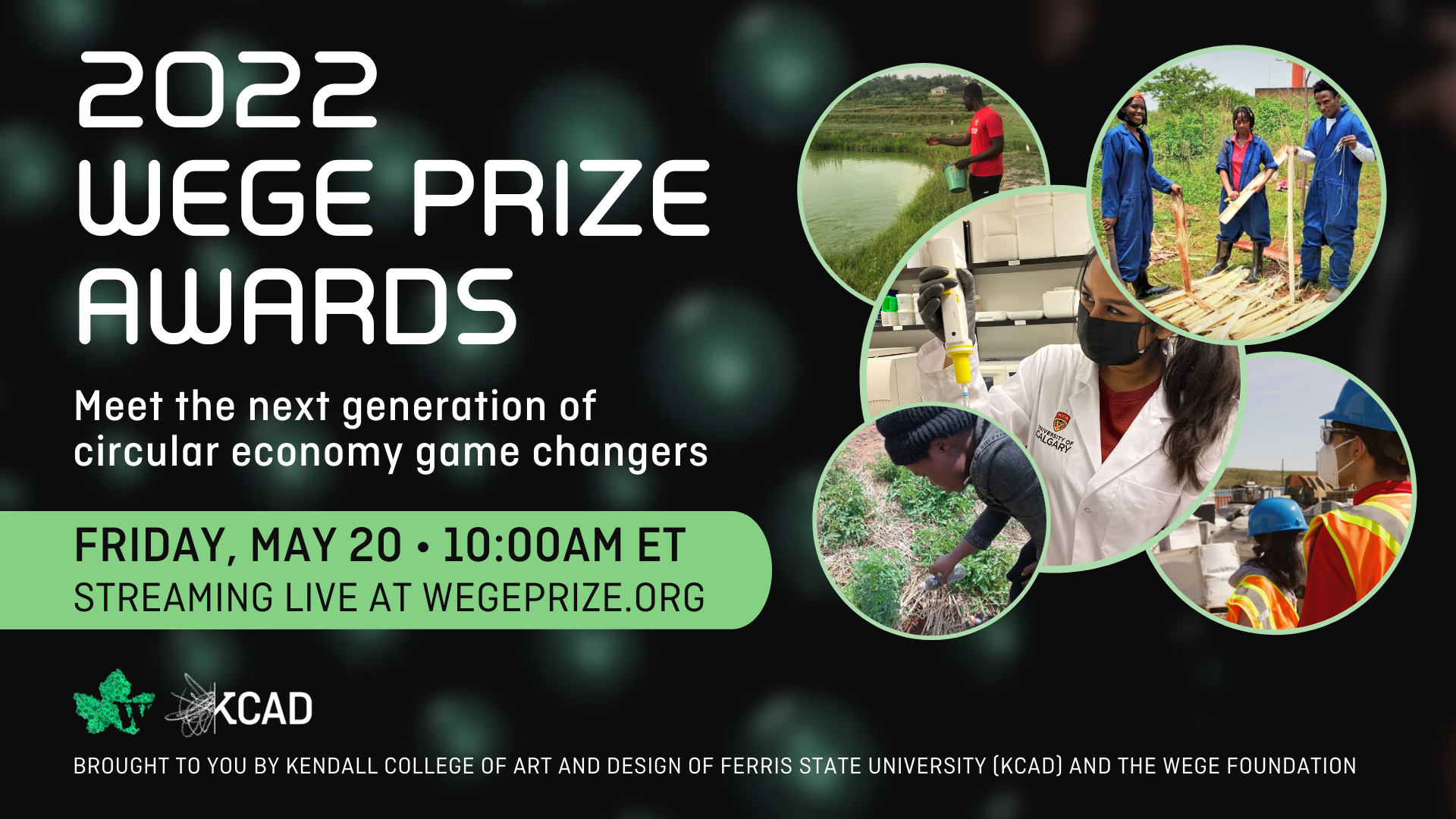
Kendall College of Art and Design of Ferris State University (KCAD) announces
finalists for Wege Prize 2022, global competition for the circular economy solutions
Student teams from all over the world debut innovative approaches
to address global challenges in ways that transform the economy
Grand Rapids, Michigan, USA April 20, 2022 — Offering new ideas that can positively impact nations worldwide, five student teams are advancing as finalists for Wege Prize, the international student design competition with a $65,000 USD total purse to create solutions for “wicked problems” such as hunger, waste, pollution and climate change.
Announced by its organizer Kendall College of Art and Design of Ferris State University (KCAD), the 2022 edition of Wege Prize will showcase the finalists’ work in a May 20 streaming presentation with global attendance, at 10:00am eastern time. The finalists selected this month are drawn from a global field representing 70 academic institutions in 29 countries with students active in almost 100 areas of academic study.
“These inspired, dedicated students are innovators and disruptors in key areas that will help us address the multitude of issues facing the world today,” says Gayle DeBruyn, a KCAD professor and leader of Wege Prize. “We are delighted to see the five finalist teams working with our diverse group of supportive judges to nurture their inventive ideas and create tangible solutions that can help accelerate our transition to a circular economy.”
The finalist teams include participants from universities in Africa, Asia, the Middle East and North America — everywhere from Canada to China and Mozambique to the United Arab Emirates. The team names and their varied innovations are:
AquaPro, a super-efficient aquaponics system to grow fish, vegetables and duckweed.
Neocycle, a plan to recycle valuable rare-earth elements from electronics waste.
ROBUST, a method for transforming banana fiber waste into textiles and paper bags.
SCUP Aquaculture, an ocean platform concept benefiting fish biodiversity and allied industries.
Green Promoters, a team creating an organic pesticide fertilizer to replace chemical products.
Wege Prize is a widely acclaimed and globally recognized competition serving as an agent of change for these disruptive concepts — and lofty student ambitions. It has drawn participants from the best academic programs at leading universities worldwide, from U.S. Ivy League schools to national science and technology universities in India, Ghana, China, Japan and Chile.
Guided by direct feedback from the competition’s panel of expert judges – including specialists in design, circular economy, education, and sustainability from Europe, South America and the United States — participating teams refine their solutions over three distinct phases as their scope and complexity grows more challenging. From that process, the five teams chosen this month have earned the opportunity to compete for $65,000 USD in total cash prizes, awarded annually to those whose ideas spark the brightest hope for real world implementation and success. This year’s five teams of promising future innovators and change-makers were selected from a group of 14 semifinalists.
The solutions Wege Prize teams create have gone on to make real-world impact. 2018 winner Rutopia’s eco-sensitive tourism concepts, covered by top editors at Forbes, has gained additional funding and support while blossoming into a fully-fledged business. Others like 2020 Wege Prize winner Hya Bioplastics and the 2021 team The Chilensis have advanced to prestigious business incubators that have further strengthened the groundwork to implement their prizewinning ideas.
“With climate change and so many other pressing global issues coming to a head, the world needs people who can work across boundaries to solve problems now more than ever before,” adds KCAD’s DeBruyn. “Every Wege Prize team is advancing a thoughtful and creative approach for helping transition our linear economy of taking, making and disposing, into a circular one that’s restorative by design.”
Wege Prize was established in 2013 to solve complex, layered problems and to encourage students in higher education to take a diverse, collaborative approach in developing new, tangible solutions to produce and consume essential goods in sustainable ways that are applied and used after the competition’s conclusion.
This year, a free livestream of the finalist teams, the 2022 Wege Prize Awards will be held on May 20, 2022, when the top groups will present and defend their bold ideas in front of expert judges and a global online audience. Event details and registration can be found at https://2022wegeprizeawards.eventbrite.com.
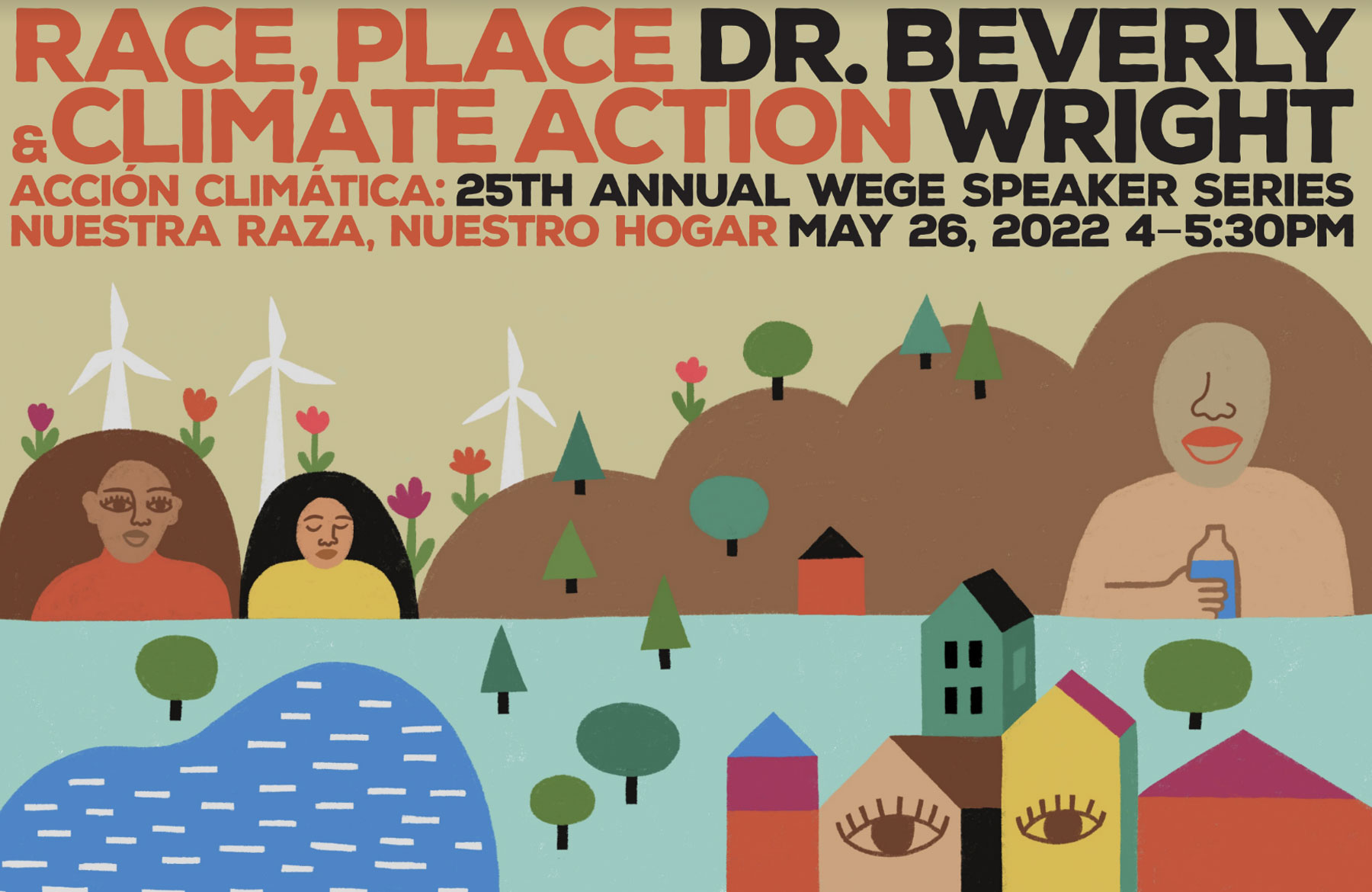
The White House Environmental Justice Advisory Council member will give a virtual presentation on Thursday, May 26, 2022 Grand Rapids, Michigan – April 26, 2022 – The Wege Foundation will host the 25th annual Wege Speaker Series (www.wegespeakerseries.com) on Thursday, May 26 at 4 pm.
This year’s event will be virtual.
 Presenting is Dr. Beverly Wright, award-winning environmental justice scholar, advocate, author, civic leader and professor. She is the founder and executive director of the Deep South Center for Environmental Justice in New Orleans, a community-university partnership organization that focuses on health inequities and environmental racism along the Louisiana Mississippi River Chemical Corridor and the Gulf Coast Region. The Center provides education, health and safety training, and job placement for residents in climate-impacted communities within the United States. Recently, she was appointed by President Biden as a member of the White House Environmental Justice Advisory Council to help support his whole-of-government approach to the climate crisis.
Presenting is Dr. Beverly Wright, award-winning environmental justice scholar, advocate, author, civic leader and professor. She is the founder and executive director of the Deep South Center for Environmental Justice in New Orleans, a community-university partnership organization that focuses on health inequities and environmental racism along the Louisiana Mississippi River Chemical Corridor and the Gulf Coast Region. The Center provides education, health and safety training, and job placement for residents in climate-impacted communities within the United States. Recently, she was appointed by President Biden as a member of the White House Environmental Justice Advisory Council to help support his whole-of-government approach to the climate crisis.
As a child growing up in southern Louisiana, Wright’s understanding of environmentally compromised communities was close to home. She lived along the highly polluted 85-mile stretch of land between Baton Rouge and New Orleans known as ”cancer alley.” These childhood experiences shaped her eventual career choices in research and activism. “Dr. Wright combines her knowledge as a scholar and her experience as an advocate to assure equitable approaches to addressing climate change,” said
Wege Foundation President Mark Van Putten. “There can be no better time for Dr. Beverly Wright to describe her groundbreaking strategies as Grand Rapids and West Michigan develop and implement local climate change strategies.” “We are looking forward to Dr. Wright’s lecture and learning how we may be able to complete similar projects in Grand Rapids,” said Alison Waske Sutter, Sustainability and Performance Management Officer at the City of Grand Rapids. “Her talk will come on the coattails of a recent invitation for our city to participate in the White House’s national Building Performance Standards (BPS) Coalition.” “With data from new screening tools and studies, the extent of environmental injustice in our neighborhoods with the highest concentration of People of Color is becoming impossible to ignore,” said Sergio Cira-Reyes, Climate Justice Catalyst at the Urban Core Collective. “Dr. Wright’s research and expertise is exactly the wisdom we desperately need to start addressing these layers of injustice woven into other social determinants of health.” Dr. Wright received the 2003 Distinguished Alumni Award from the State University of New York, Buffalo, the Robert Wood Johnson Community Health Leadership Award in 2006, the 2008 EPA Environmental Justice Achievement Award, the Rainbow PUSH Coalition 2008 Community Award, the Ford Motor Company’s Freedom’s Sisters Award in 2009 and the Urban Affairs Association’s SAGE Activist Scholar Award in 2011. She was also recognized by theGrio as one of its 100 History Makers in the Making.
She is the author of numerous scholarly articles and has co-authored the books Race, Place, and Environmental Justice After Hurricane Katrina and The Wrong Complexion for Protection: How the Government Response to Disaster Endangers African-American Communities.
Dr. Wright received a Ph.D. from State University of New York at Buffalo.
Please register by May 25, 2022 at: wegespeaker2022.eventbrite.com
Partners for the 25th Wege Speaker Series event include:
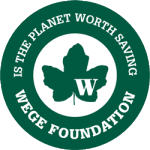
We mourn the killing of Patrick Lyoya by a Grand Rapids police officer. We join all those grieving for Mr. Lyoya’s family and friends and for our community. We have pledged to listen to and learn from the voices of outrage and suffering and to support organizations working to right longstanding injustices and to bring systemic change.
In this moment of grief, we seek to highlight and support the leadership of our grantee partners in the arduous work of dismantling systemic inequities still lingering in our community. Several organizations, including grantees, have put forth specific proposals to reform policing and law enforcement. We are committed to supporting effective civic engagement by front-line organizations in this effort.
We pledge to strengthen the Foundation’s support through its grants and investments of organizations working for concrete, systemic progress in racial justice including policing practices, opportunities for wealth creation, economic advancement, access to a healthy environment and community wellbeing. In addition to policy and systems reform, we are also committed to helping address the community trauma from this tragedy and from recurring instances of injustice.
There are many things about our community of which we are proud. But, we are ashamed of the continuing systematic racism and injustice so brutally illustrated by this tragedy. The tragic ending of Patrick Lyoya’s life must be an impetus for effective and lasting societal change.
– END –
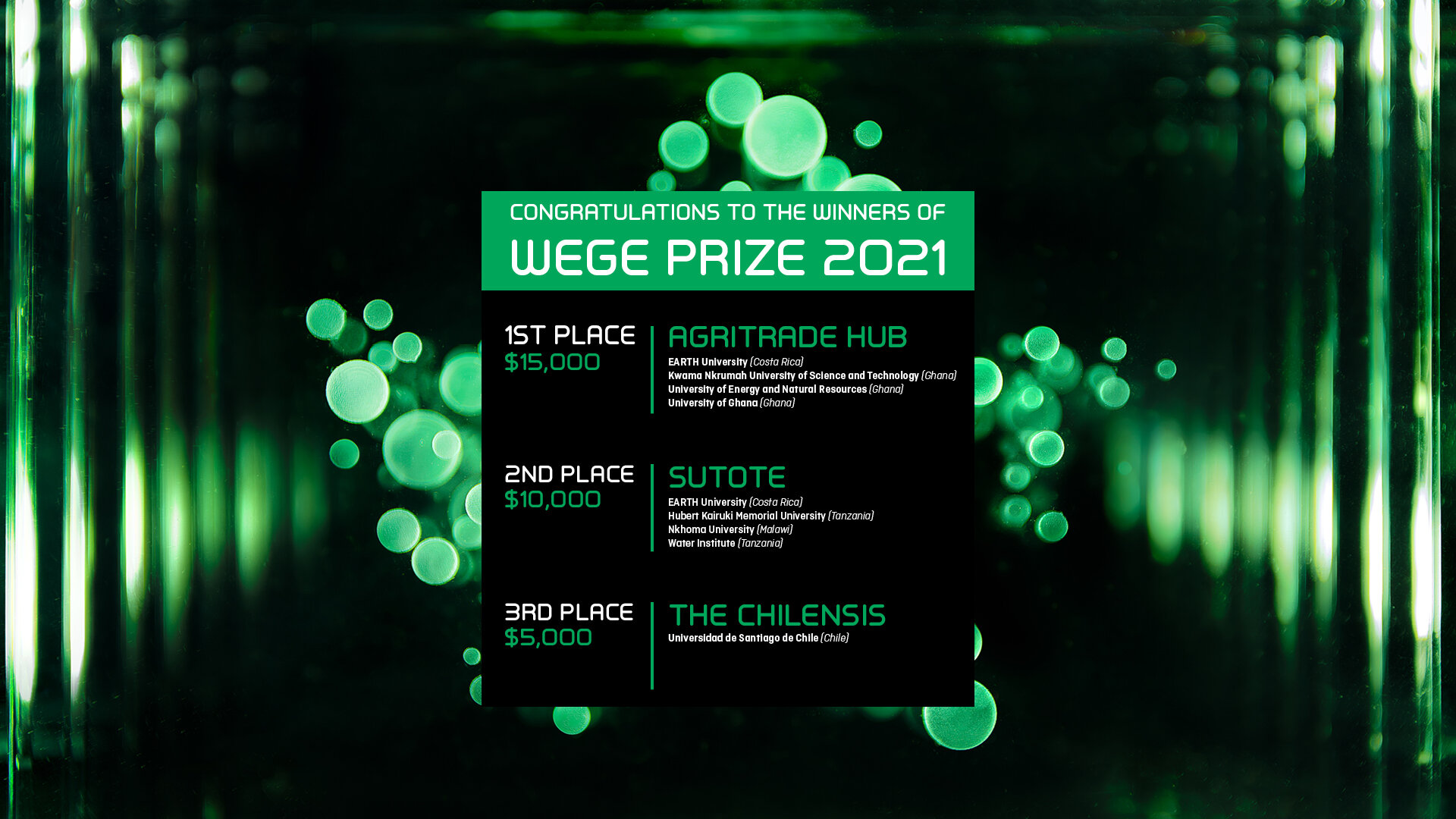
Tackling the world’s most pressing, complex “wicked problems” by addressing global issues with design thinking, the winners have been announced for Wege Prize, an acclaimed international student design competition organized by Kendall College of Art and Design of Ferris State University (KCAD). The winning teams, sharing a $30,000 USD purse and earning broad visibility for their ideas, hail from Chile, Costa Rica, Ghana, Malawi and Tanzania. The students presented their ideas at a live online event as the culmination of a nine-month-long competitive process supported by expert judges.
As reported widely in trade and news media, Wege Prize provides a powerful and accessible platform for any college or university student in the world to develop tangible solutions to serious challenges, benefiting from a collaborative process that transcends disciplinary, cultural, and institutional boundaries. The resulting solutions — including many that go on to join incubators and earn startup funding — address climate and environmental impacts, social and economic disparities, and cycles of waste, hunger and poverty.
This month, KCAD has announced that Wege Prize has been awarded grant funding to extend the annual competition for five more years, with a new growth plan to increase the prize purse by over 100% to $65,000 USD, to double its pool of judges, and to begin exploring future extensions of Wege Prize to serve more students and communities.
“Wege Prize teams are inspired to reframe the way we produce and consume by collaboratively developing products, services, business models, and other solutions that address systematic issues,” says Gayle DeBruyn, KCAD professor and Wege Prize organizer. “The participating teams also help chart paths to transition from our current linear economy — in which we take, make, and dispose — to a circular economy that’s regenerative and restorative by design. We need to champion more of these creative, daring problem- solvers!”
Earning first place in 2021 is the team AgriTrade Hub, which unites a student from Costa Rica’s EARTH University with three universities in Ghana to not only find uses for the problematic wood and sawdust waste created by the Ghanaian logging industry, but also to turn those waste materials into agricultural and economic value. Among the nutrient-giving byproducts of the proposed solution is a mushroom compost ideal for fertilizing newly planted forests and valuable ornamental trees. (More details follow, below.)
“Our solution is geared toward supporting the local economy, and contributing to food security and nutrition through the production of nutrient-rich oyster mushrooms,” says AgriTrade Hub team member Victoria Akwamaa Yeaboah, a student in agricultural science and natural resource management at EARTH University. “With our focus on ensuring that nearly all the resources are used up, we’re contributing to a circular economy that helps redefine the universal issue of wood waste.”
At the 2021 Wege Prize Awards event held online recently, AgriTrade Hub presented as one of five finalists that emerged from an initial field of 35 teams — a record field for Wege Prize — representing 29 countries, 88 academic institutions, and 114 unique academic disciplines. The five finalist teams presented bold ideas that evolved over nine months of intensive research, testing, networking, prototyping, and direct feedback from the competition’s panel of expert judges.
AgriTrade Hub won the $15,000 first place prize. The second- and third-place teams were awarded $10,000 and $5,000 respectively, and the two other finalists earned $1,000 each. (The total cash awards given will more than double in the 2022 iteration, says DeBruyn.)
Click here to learn more about the 2021 winners and finalists.